John Currie is in a hurry. Forget the elevator on the sixth floor of McCreary Tower at Truist Field. He’s running down the stairs. As the Spirit of the Old Gold and Black marching band performs its show before the Wake Forest-Army football game, Currie is beelining for the field, just one stop of many on this perfect football evening in October.
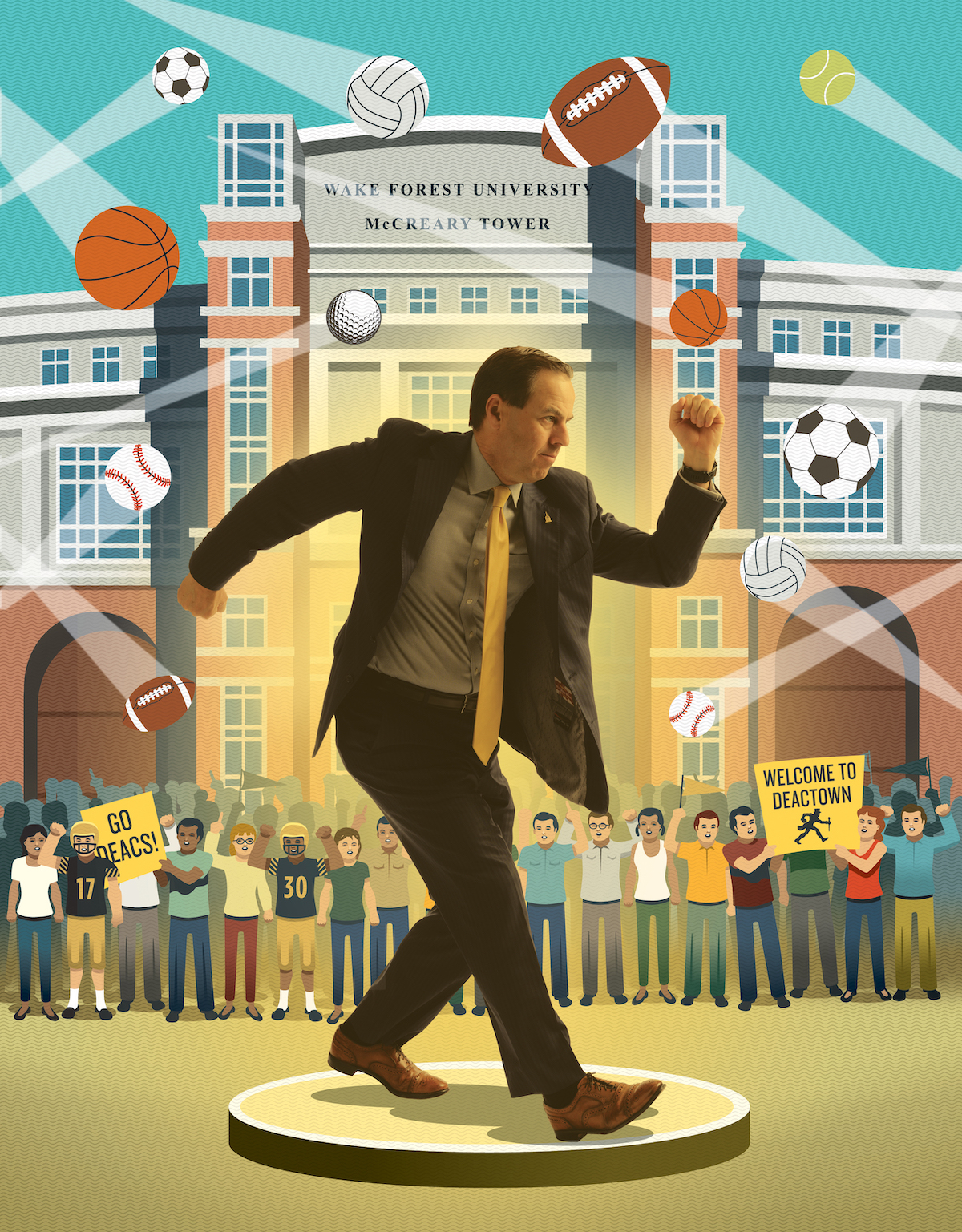
“Let’s go,” Currie says as we head down the stairs. Every athletics staffer who has learned that I will be following Currie (’93) at the game has offered a knowing smile and a version of “good luck.” I’ve been warned that Currie has a motor that never stops and that he could outlast the Energizer Bunny. Currie himself told me, “Wear your running shoes.” Before we hit the stairs I’m already behind.
We reach the field in time to watch the “Open the Gate” ceremony. U.S. Army Maj. Gen. Brian Mennes, deputy commanding general of the XVIII Airborne Corps, rides in on the back of a motorcycle driven by the Demon Deacon. As the football team rushes onto the field, fireworks burst above a sold-out stadium. Currie takes in the scene and stands still, one of the few times all night.
Currie, 51, has been running full speed since he succeeded Ron Wellman (P ’98, ’01), his longtime mentor and onetime boss, to become Wake Forest’s sixth director of athletics. After starting his career as an intern in the Deacon Club and serving as the athletics director at Kansas State University and the University of Tennessee, Currie returned home in 2019.

John Currie at the 2021 TaxSlayer Gator Bowl in Jacksonville, Florida

Women’s soccer players Hulda Arnarsdottir (’20, MA ’22), left, and Shayla Smart (’22)
“Wake Forest athletics was chugging along nicely and doing well by all standards, academically and athletically,” says Peter Brubaker (MA ’86, P ’17), Wake Forest’s faculty athletics representative to the Atlantic Coast Conference and NCAA and professor and chair of health and exercise science. “And then the bullet train came through the station, and you were already late, and you’re grabbing on and trying to hold on.”
Don’t expect Currie to slow down. He has the energy and passion to drive the athletics train to more ACC and national championships. And to anyone still tempted to describe Wake Forest as “the little engine that could,” that train left the station many championships ago. “We’re a jet engine now,” he says. As of early November, Wake Forest boasted nationally ranked teams in field hockey, men’s soccer and men’s cross-country. When I ask him for an assessment of the athletics program, he offers one word: “Ascending.” Then he adds, not surprisingly, “and accelerating. And I believe our best days are ahead of us.”
Before his introductory news conference as athletics director, Currie stopped by his freshman room, 304B Kitchin Residence Hall, much to the surprise of the student living in what once was a tiny unairconditioned, back-room double. Currie’s story now includes “a chapter that I could never have imagined as an 18-year-old freshman,” he said at the news conference. “The best of everything I have in my life — my wife and family, my professional values, my career and my friendships — begins with Wake Forest.” 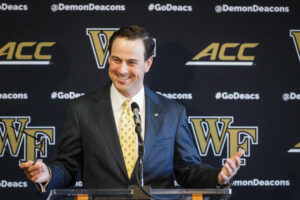
Less than a year into his tenure, COVID-19 shut down much of the world and upended sports schedules. He grew weary of hearing what one couldn’t do. He saw it as an opportunity and created a CAN committee: What can we do? COVID will end at some point, so let’s be ready to sprint out of the pandemic, he liked to say. Seeking to revive the basketball program, he made a coaching change at the height of the pandemic, replacing basketball coach Danny Manning with East Tennessee State’s Steve Forbes, the only men’s basketball coaching change at a major school in the spring of 2020. In spring 2022, he hired American University’s Megan Gebbia as the women’s basketball head coach.
 Last fall, every team qualified for postseason action for the first time in history. Since late 2021, Wake Forest has won ACC championships in men’s and women’s golf and men’s cross country and an Atlantic Division title in football. The University has had five ACC coaches of the year: Forbes, football coach Dave Clawson, field hockey coach Jen Averill, women’s golf coach Kim Lewellen (P ’25) and John Hayes, director of track & field and cross country. Numerous athletes have been named ACC Player of the Year and to All-American and All-ACC teams and to the ACC Academic Honor Roll. New basketball locker rooms named for Chris Paul (’07) and Dr. Caryl Guth (’57, MD ’62) opened in the Miller Center last year. The $38 million McCreary Football Complex opens this spring.
Last fall, every team qualified for postseason action for the first time in history. Since late 2021, Wake Forest has won ACC championships in men’s and women’s golf and men’s cross country and an Atlantic Division title in football. The University has had five ACC coaches of the year: Forbes, football coach Dave Clawson, field hockey coach Jen Averill, women’s golf coach Kim Lewellen (P ’25) and John Hayes, director of track & field and cross country. Numerous athletes have been named ACC Player of the Year and to All-American and All-ACC teams and to the ACC Academic Honor Roll. New basketball locker rooms named for Chris Paul (’07) and Dr. Caryl Guth (’57, MD ’62) opened in the Miller Center last year. The $38 million McCreary Football Complex opens this spring.
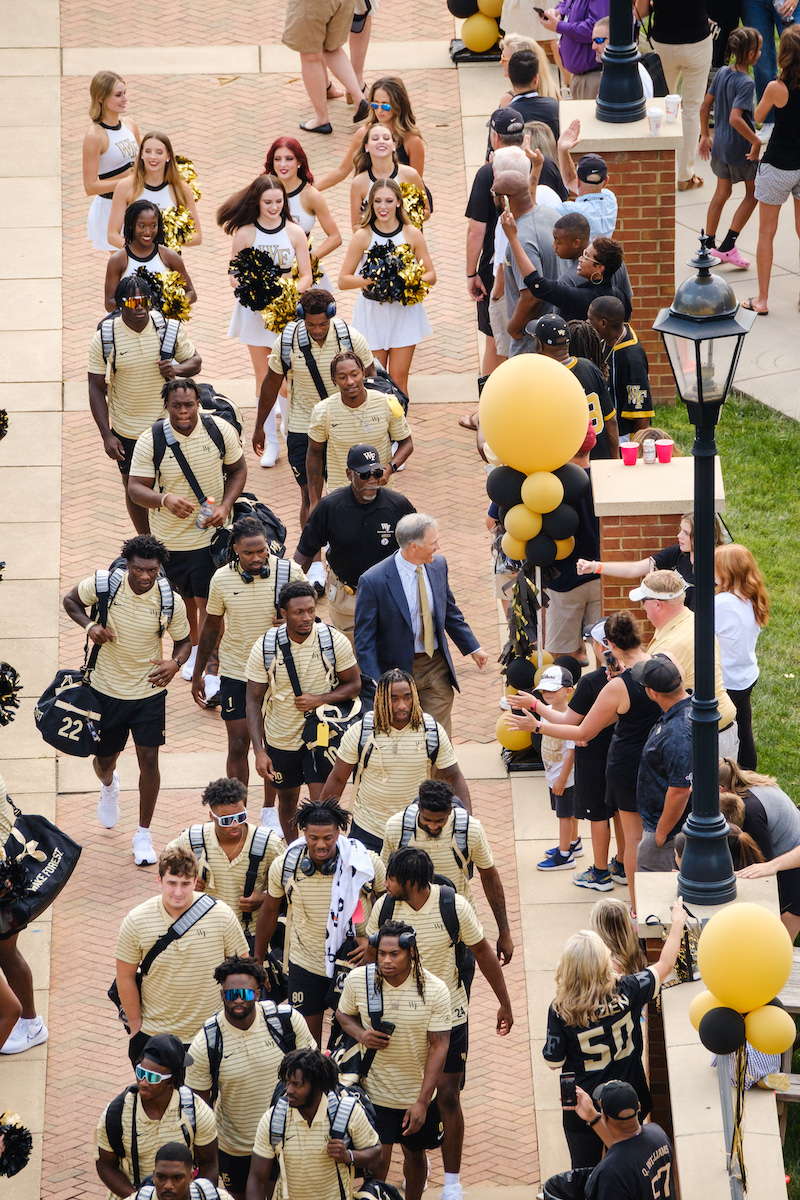
Fans greet head coach Dave Clawson and the football team during the Deacon Walk before the Wake Forest-Liberty game in September.
How does Wake Forest, the smallest Power 5 school, succeed? That’s a question Currie says others often ask. It’s investing in the right coaches and state-of-the-art facilities and providing student-athletes with the resources to succeed and the opportunity for an education at a top-30 national university. “Wake Forest’s advantage and pathway to continued excellence is the fact that we are really distinctive,” he told an alumni group at Homecoming in mid-September. “Rather than worry about the things we can’t control — which we don’t — we have chosen to focus on being really excellent at the things that are distinctive about Wake Forest.”
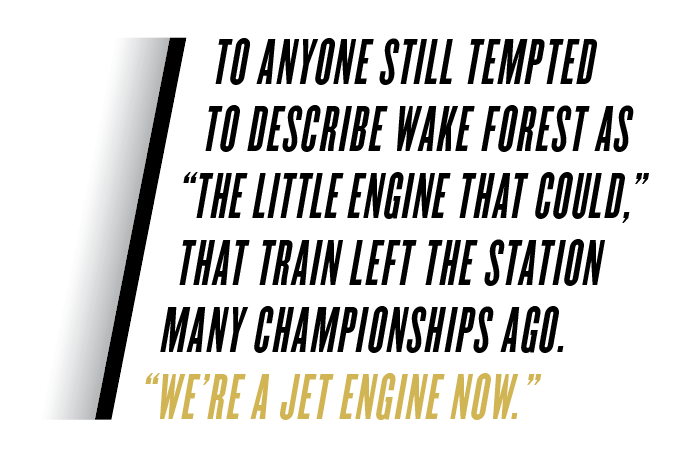
Wake Forest trustee Ben Sutton (’80, JD ’83, P ’14, ’19), founder and chair of Teall Sports & Entertainment, has worked with hundreds of athletics directors in his roles at Teall, ISP Sports and IMG College. Currie is one of the best, he says. “The pressure to perform, achieve and win in college sports is higher than at any point I’ve ever seen,” Sutton says. “But John relishes that challenge, and he’s up to it.”
Currie preaches five guiding principles: Create a world-class student-athlete experience; ensure integrity in academics, compliance, finance, inclusion and safety; bring value to the University, Winston-Salem and the Triad; win championships; and provide the best fan experience in North Carolina.
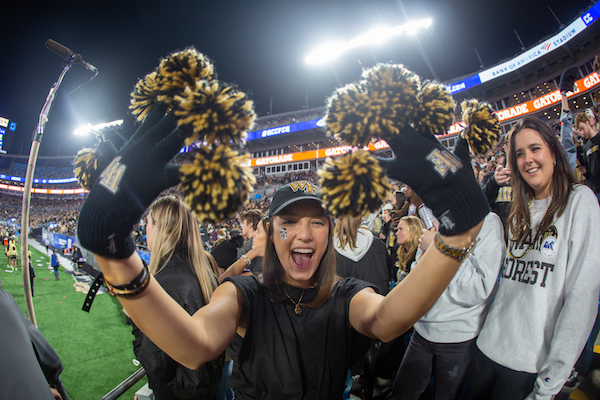
“We don’t need to be the biggest or the most expensive, but we should be a model program,” Currie tells me in his small office in Manchester Athletic Center. His Wake Forest diploma hangs above two plaques from the National Association of Collegiate Directors of Athletics recognizing him as Athletics Director of the Year last year and, in 2013, at Kansas State. Family photographs rest on several bookshelves amid books on leadership. A whiteboard is covered with scribblings in blue and black ink, most of which I can’t read, except for “Connection = Culture” written in large letters.
Two days after Wake Forest defeated Army, Currie met with his senior administrative staff, as he does most Monday mornings. He peppers the group with questions about things he noticed at the game. No detail escapes his notice, from traffic on Deacon Boulevard to replays on the giant video board. To provide the “best fan experience” means constantly raising, and exceeding, expectations. “John has an amazing mindset of ‘it can always be better,’” says Barry Faircloth (’93, P ’22, ’24), the longtime executive associate athletic director for external operations. “He wants to see things with his own eyes and make changes based on what he sees.”

Currie made it a priority to reengage students — “to have fun” coming out of the pandemic with Friday night fireworks and pep rallies on Hearn Plaza before home football games and free food at the student tailgate. He’s enhanced communications through daily emails featuring the stories of student-athletes, coaches and alumni. He uses his own weekly e-newsletter, From the Quad, to celebrate athletics accomplishments and as a platform to promote other areas of the University; one discussed an upcoming basketball game and Undergraduate Research Day.
He wants students, alumni and Winston-Salem residents to join in the fun of Wake Forest athletics, as he did when he was a student celebrating with classmates and student-athletes after big wins over Duke or Carolina. You can almost hear him calling out, “Come on, let’s go to Deactown.”
“The engagement and excitement of (Wake Forest) students around athletics, the incredible environment for our student-athletes and the incredible atmosphere in this moment will be a lifetime memory for everyone who’s here,” Currie says.
John’s dedication to Wake Forest is unwavering. His devotion to the mission of the University is steadfast, and it’s clear his support of student-athletes, coaches and staff is always top priority.”
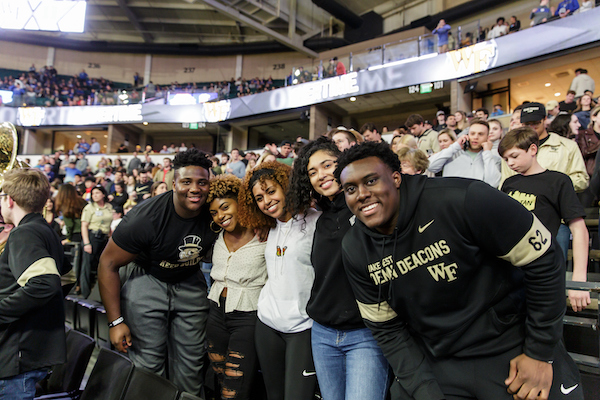
Currie has mementos of several special moments in his office,
including a football from his first win as athletics director at Wake Forest (vs. Utah State on Aug. 30, 2019) and one from the 2021 TaxSlayer Gator Bowl. A framed photograph of Randolph Childress (’94, P ’20) hitting the winning shot in the 1995 ACC Basketball Championship hangs on one wall. And no Wake Forest AD’s office would be complete without a photograph of Brian Piccolo (’65, P ’87, ’89) with his teammate and future Wake Forest football coach John Mackovic (’65, P ’97).
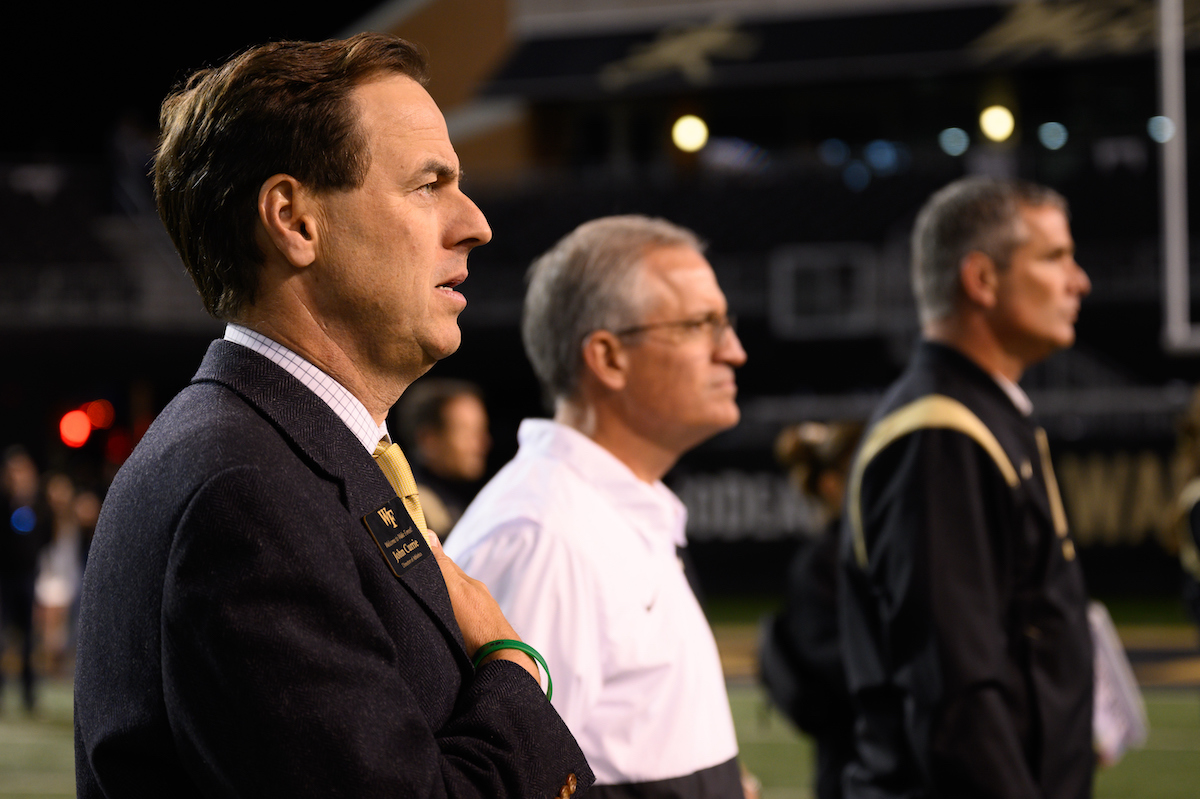
John Currie sings the alma mater at the Wake Forest-Army football game in October.
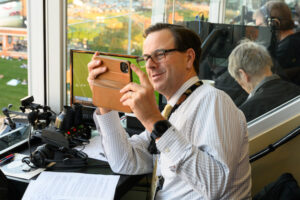
Currie snaps a photo during a radio interview before the Wake Forest-Army game.
Currie still remembers his first big Wake Forest wins growing up in the heart of Tobacco Road in Chapel Hill, North Carolina. He was 8 years old when he watched Wake Forest defeat North Carolina, 24-19, in Kenan Memorial Stadium in 1979 on the way to the Tangerine Bowl. In 1982, he was in Carmichael Auditorium when Wake Forest, led by Danny Young (’84) and Jim Johnstone (’82), upset the No. 1 Tar Heels, 55-48, one of only two defeats that season for the eventual national champions.
But his memories come with a twist. In those days, Currie was an “obnoxious” — his word — Carolina fan. His parents and other family members graduated from UNC-Chapel Hill, and he grew up going to Carolina games with his father. His father, who died in 2015, was a Morehead Scholar who also earned a medical degree from UNC and was on the faculty at the medical school and later at Johns Hopkins and Dartmouth medical schools. Currie’s mother was a librarian who later earned a divinity degree from Duke University and became a Methodist minister.
At Chapel Hill High School, Currie was president of his senior class and editor-in-chief of the student newspaper. He played soccer and baseball, and while he wasn’t the best player, he hustled. “I had to overcome my lack of athleticism with hard work and effort” is how he puts it. As much as he loved sports, he loved studying history, too. His grandfather was a D-Day veteran, and Currie devoured as many books on World War II as he could find.
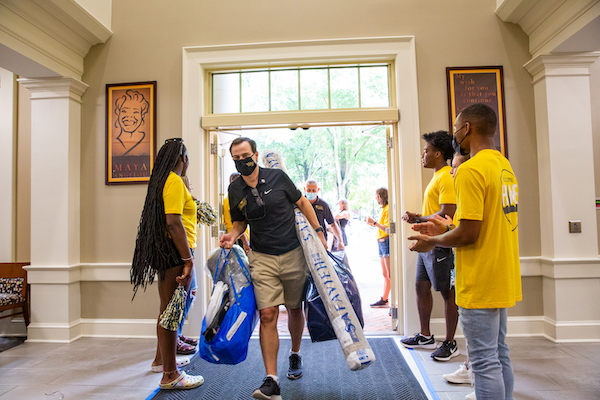
Currie helps new students move into Maya Angelou dorm in August 2021.
His bloodline may have run Carolina blue, but there were enough Demon Deacons in his life — in his Baptist church, a couple of cousins and even his dentist, Bob Williams (’58, P ’88, ’91, ’94) — to nudge him to the black and gold. He wanted to attend a smaller college and was familiar with Wake Forest after spending a summer week on campus at North Carolina’s Boys State. He wrote his college essay on, of all things, laundry and the fact that he did his own, which landed him on the waitlist at Wake Forest. He was heading to Rhodes College in Memphis, Tennessee, when he was plucked off the waitlist to become a Demon Deacon.

One November afternoon in the Manchester Athletic Center, Currie stops in a stairwell to ask a couple with their teenage son, who appear lost, if they need help. They’re looking for the office of baseball coach Tom Walter (P ’23). Currie tells them that Walter’s office is at Couch Ballpark, but he doesn’t send them on their way without a friendly chat. 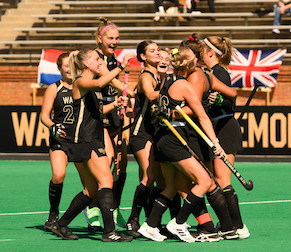 When the mother asks Currie what he enjoyed most about being a student at Wake Forest, he replies, good friends, a beautiful campus, strong academics and Division I sports. He points out Couch Ballpark on their campus map, gives them his business card and wishes them well as they leave, heading in the right direction.
When the mother asks Currie what he enjoyed most about being a student at Wake Forest, he replies, good friends, a beautiful campus, strong academics and Division I sports. He points out Couch Ballpark on their campus map, gives them his business card and wishes them well as they leave, heading in the right direction.
When Currie touts the benefits of Wake Forest, he speaks from his well-rounded experience. He played on the club soccer team, served in student government, wrote a senior paper on Stalin’s purges of the Soviet military before World War II and took trumpet lessons with “Mzeztee,” Barbara Trautwein (P ’89). (He can still play “Taps.”) He was social chair in the Delta Kappa Epsilon fraternity, leading some to call him the “cruise director,” fraternity brother Steve Bumgarner (’95, MBA ’02, P ’26) recalls. “He was always creating, doing, leading. He always had a plan.” He cheered on Randolph Childress and Rodney Rogers (’94) in the new Lawrence Joel Veterans Memorial Coliseum and rushed the Groves Stadium field when Wake Forest upset Clemson in 1992, but he did not, he emphasizes, tear down the goal post.

Currie and his predecessor, Ron Wellman (P ’98, ’01), at the Wake Forest-Army game
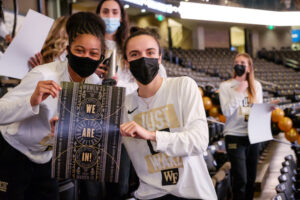
Women’s basketball players Jewel Spear (’24) and Gina Conti (’21) react after the team received an invitation to the 2021 NCAA Tournament.
But for someone who always had a plan, Currie wasn’t sure what he wanted to do after college. A history major, with a minor in what was then called politics, he thought about becoming a high school history teacher and a baseball or soccer coach. He took an education class and observed classes at Glenn High School in Kernersville, North Carolina, but decided that an early morning wake-up call for student teaching wasn’t for him. Currie’s dad gave him a push, writing him in a letter that Currie still has, that “you don’t have to know exactly what you want to do, but you have to do something.”
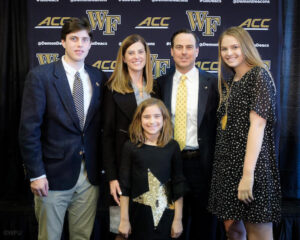
Currie and his wife, Mary Lawrence Hibbits Currie, and their children, Jack, GiGi and Mary-Dell (front) at his introductory news conference in March 2019
Currie became a regular at what was then the Career Services office on the ground floor of Reynolda Hall, where he’d scan the rows of clipboards with sign-up sheets for recruiters coming to campus. “I’d sign up and interview, and I really had no clue,” he recalls. “I’m sure I was the interviewee who the interviewers made fun of that night back at the hotel.”
He may have been bound for the management track at Taco Bell — one of his job offers — until he met Ron Wellman, who succeeded Gene Hooks (’50, P ’81) as athletics director in 1992, at a student government meeting. Wellman was impressed with the eager young student with an interest in athletics and invited him to drop by to talk. That led to an internship in the Deacon Club and later a position as assistant director.
Currie speaks fondly of those years in athletics fundraising. Wellman, Cook Griffin (’65, P ’00), Mike Pratapas (’85, MAEd ’88), the late Charlie Patterson and others influenced his entire career, Currie says, from fundraising skills he took to Kansas State and Tennessee to the values he still carries. “I tell young people that when you’re going into your first job, you have to be cognizant of the people that you’re working with and for,” he says. “Their commitment to doing things the right way is your baseline. Their culture becomes your culture. I was incredibly fortunate and blessed that I was born into a culture of integrity.”

Currie left Wake Forest in 1997 to lead the athletics scholarship fund at the University of Tennessee, then returned to Wake Forest as assistant athletics director for development. He went back to Tennessee as executive associate athletics director, where he broadened his portfolio to include building projects and coaching searches and earned a master’s degree in sport management. He was named athletics director at Kansas State in 2009 and led the Wildcats through eight years of academic, athletics and fundraising success, including Big 12 championships in football, men’s basketball and baseball in the same year.
He returned to Tennessee again in 2017 as vice chancellor and director of athletics but was forced out after only eight months amid a search for a football coach that turned political. What did he learn from that experience? “I was reminded how important my family is to me and my sense of integrity,” he says simply.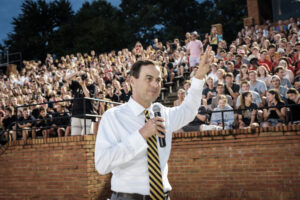
Currie and his wife, Mary Lawrence Hibbits Currie (’96, MSA ’97), have three children, Jack, 21, GiGi, 19, and Mary-Dell, 14. (Mary Lawrence, Currie tells me proudly, was in the first Master of Science in Accountancy class at Wake Forest.)  Being an athletics director isn’t an occupation, it’s a lifestyle, he says, requiring long days and time away from home. In his rare free time, Currie enjoys skiing and family trips to a house in Montreat in the North Carolina mountains.
Being an athletics director isn’t an occupation, it’s a lifestyle, he says, requiring long days and time away from home. In his rare free time, Currie enjoys skiing and family trips to a house in Montreat in the North Carolina mountains.
The Tennessee experience also reminded him how many friends he has in the sports world. They encouraged him to stay in the game. Another opportunity will come, they told him. He taught at Columbia University and was a consultant for the University of Texas at Austin before the next opportunity came at the perfect place, Wake Forest. When I ask him if he thought about leaving athletics, he pauses for a moment.  “I’ve never felt like college athletics was my only identity,” he says. “There are other things that are interesting to me in business and community development and higher education. But I really love being part of a team and wanted to be back on a team.”
“I’ve never felt like college athletics was my only identity,” he says. “There are other things that are interesting to me in business and community development and higher education. But I really love being part of a team and wanted to be back on a team.”

The joy of being on a team and building relationships comes up over and over in our conversations. He believes deeply in the power of athletics to build community and provide an education to student-athletes. To underscore the point, he emails me a picture of himself with a former Kansas State football player at October’s Wake Forest-Boston College football game. “Nothing is more important to me than the relationships I have, whether it’s student-athletes from long ago or more recently at Wake Forest or Kansas State or Tennessee,” he says.

The Currie bullet train isn’t likely to slow down. In the ever-competitive world of college athletics, if you slow down, you die, he says. “To be successful in this enterprise, you have to operate with a high degree of urgency. You can’t stop. Certainly, we need to take time and enjoy the moment and appreciate it. But I have the responsibility to ensure that we’re building for the next moment.” 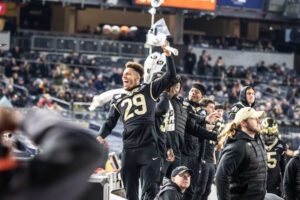
That means looking ahead to what’s next for Truist Field and the Lawrence Joel Veterans Memorial Coliseum and how to revitalize the Deacon Boulevard area around the stadium and coliseum. Then there are the challenges — name, image and likeness deals, the transfer portal and conference realignments — that are threatening the amateur model at the heart of intercollegiate athletics. Currie exudes the confidence that whatever happens, Wake Forest will adapt and be just fine. “There’s been extraordinary investment and commitment and growth here, not just in athletics, but in the whole University, to get into a position of leadership,” he says.
“We’re facing a vortex of changes challenging the future of college athletics more than ever before. And yet Wake Forest athletics and Wake Forest University are in the strongest place we’ve ever been. Think about that. … I like our chances because there are plenty of schools that are not at their strongest.”
“The pace of change and the amount of change affecting Division I athletics is incredible. I don’t think in John’s mind it’s a matter of surviving; he’s always playing offense. He’s thinking about the opportunity for Wake and how we can thrive.”
As the final minutes tick off the clock in Wake Forest’s 45-10 victory over Army, Currie leaves his box in McCreary Tower to head back to the field. He takes the elevator this time to the stadium concourse. With daughters GiGi and Mary-Dell in tow, he runs down the stadium steps to reach the field just as the game is ending.
He stands at midfield as the Wake Forest and Army players walk over to the visiting fans in section 11 for the playing of the West Point alma mater. Then the players head in the opposite direction to stand in front of the Wake Forest student section. Currie puts his hand over his heart and sings along as the band plays the Wake Forest alma mater. As the football team heads into the locker room, he offers a quick congratulations to coach Dave Clawson.
“That’s it, we’re done,” he tells me. But his weekend is far from done. The next day, he’s got field hockey, volleyball and women’s soccer games on campus. His nonstop pace to keep the jet engine of Wake Forest athletics flying high is just beginning.

John Currie’s pregame routine includes checking out the student tailgate behind the east concourse. His emphasis on engaging students paid off with a record turnout of students at football games in 2022.<br />


